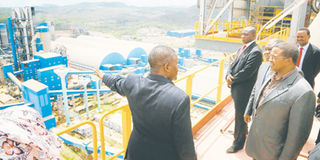2 oldest cement firms vow to beat the odds to thrive

Former President Jakaya Kikwete visits Dangote Cement plant in Mtwara in the past. PHOTO|FILE
What you need to know:
- Tanzania Portland Cement Company (Twiga) and Tanga Cement (Simba) which are both listed on the Dar es Salaam Stock Exchange (DSE) reported profits even after entrance of new players like Dangote Cement that was expected to shake the market.
Dar es Salaam. Two oldest cement companies are optimistic about their business performance in 2016 after posting profits in the first six months despite intense market competition.
Tanzania Portland Cement Company (Twiga) and Tanga Cement (Simba) which are both listed on the Dar es Salaam Stock Exchange (DSE) reported profits even after entrance of new players like Dangote Cement that was expected to shake the market.
Until 2011, Tanzania was home to three cement manufacturers: Twiga, Simba and Mbeya Cement (Tembo).
To date, there are at least eight factories including Athi River Mining’s (ARM) (Rhino Cement), Dangote Cement, Camel Cement, Lake Cement, and Lee Building Materials.
However, a recent report indicated that the cost of cement in Tanzania is still higher than in other member states of the Southern African Development Cooperation that averages $5.6.
Financial reports of the two companies for the first half-year of 2016 indicate that they had robust financials even as the competition is growing.
Twiga Cement, a subsidiary of Germany’s Heidelberg Cement Group, increased its half-year revenue by five per cent to Sh142.3 billion while the net profit for the six months improved by two per cent to Sh22.7 billion compared with a similar period in 2015.
The increase in revenue was attributed to mainly “higher sales volumes driven by growing cement demand as well as overall improvement of performance.”
“Competition in the market is expected to further increase in the second half of the year. Twiga Cement will continue working to maintain its market leadership position,” the company said in the statement.
Simba Cement realised a 55 per cent increase in net operating profit for the six months that ended June 30, 2016 compared with a similar period in 2015.
The company posted a net profit of Sh11.3 billion in the six months compared with a loss of Sh6.9 billion recorded the similar period last year.
In January 2016, Simba Cement commissioned the second kiln at its Tanga plant, and consequently, the company’s clinker production capacity has more than doubled from 0.45 to 1.25 million tonnes per annum.
“Despite the very competitive landscape the company realised a 55 per cent increase in net operating profit for the six months ended June 30,2016,” the company commented in the statement.
Simba Cement signed a deal with Tanzania Railway Limited (TRL) to transport cement to Kigoma and Mwanza.
“Tanga Cement remains optimistic about the future growth of the region and the implication thereof for the company. The competitive landscape will remain challenging; however, we expect that the playing fields will be leveled somewhat with the government’s introduction of higher tax duties on imported cement. Cement demand in Tanzania is expected to remain robust over the short- to medium-term and with its strong competitive advantage, leading brand and capable workforce. Tanga Cement is well positioned to take advantage of the growth opportunities in the market,” the firm said.
Recently, Lake Cement, the manufacturer of Nyati Cement was quoted as saying that it planned to almost double production to 100,000 tonnes per month as it anticipates high demand from infrastructure projects in the country.
Cement production increased by seven per cent to 725,000 tonnes in the first quarter of 2016 as a result of entry of Dangote Cement factory which has a capacity to produce three million tonnes per year, according to a recent statement from the Bank of Tanzania.
The statement also said that Tanzania’s demand of cement was still higher than the current supply of the product.
Imports of cheap cement from companies that enjoy tax benefits in their home countries further erode the local market thus causing significant injury to local producers. To address this issue, cement companies in Tanzania through the Tanzania Chapter of East African Cement Producers Association (EACPA), engaged the government to ensure a level playing field where imports would be charged higher tax duties.




